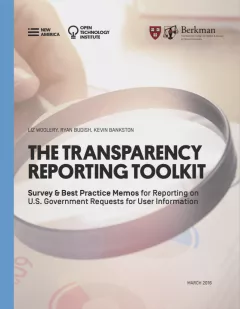
New Report Curates Best Practices in Transparency Reporting
The Berkman Center for Internet & Society at Harvard University and the Open Technology Institute surveyed U.S. Internet and telecommunications companies to highlight best practices and encourage standardization in transparency reporting.
The Berkman Center for Internet & Society at Harvard University and the Open Technology Institute at New America (OTI) are releasing The Transparency Reporting Toolkit: Survey & Best Practice Memos. This report, a compilation of eight memos, looks at the major challenges that U.S. Internet and telecommunications companies face when reporting on U.S. law enforcement and government requests for user information, and identifies industry best practices for this transparency reporting. It’s the culmination of more than two years of work by OTI and the Berkman Center cataloguing the diversity of transparency reporting approaches and engaging with a variety of companies and stakeholders about the goals and challenges of transparency reporting.
In 2013, Edward Snowden revealed details of the U.S. government’s classified surveillance programs, including those permitting access to Internet users’ data and the bulk collection of telephone records. In the wake of those revelations, Internet and telecommunications companies scrambled to rebuild lost trust. One approach many companies took was publishing “transparency reports,” publicly disclosing data on the number and type of government requests for user information they received. However, a diversity of approaches to reporting quickly led to a fragmentation of practices that have made it impossible to meaningfully compare metrics across companies.
"Over the last few years, the number and variety of transparency reports has exploded. The Transparency Toolkit Survey & Best Practice Memos is the most in-depth look at how U.S. companies are using transparency reports — identifying current practices and highlighting some of the most innovative and useful approaches," said report co-author Ryan Budish, Senior Researcher at the Berkman Center. "For companies thinking of creating transparency reports, this hopefully will be a starting place. These memos can help them anticipate the decisions they have to make, the information about requests they can track, and the approaches others are using. For companies already offering transparency reports, this will hopefully offer an opportunity to compare, improve, and innovate."
Across all 43 reports surveyed, which included those from companies such as Google, Twitter, Microsoft, Verizon, and T-Mobile, no single one embodied all of the best practices; many had elements that were best practices or innovative approaches. For example, some had better definitions, and others provided more information about user notice or legal process. These memos highlight the individual aspects of reports that are most notable.
This report is the first of three components of The Transparency Reporting Toolkit, an initiative which seeks to address the fragmentation problem. The second part of the toolkit, The Template & Guide to Reporting, will be launched in draft format for a comprehensive review process at RightsCon on April 1, 2016. The final piece of the toolkit, an interactive online portal to help companies create and publish their reports using a standardized format, will be launched later this summer.
“Transparency reporting is vital to understanding how companies respond to government requests for our online data, and how often governments are making those requests, " said Liz Woolery, Policy Analyst at the Open Technology Institute and co-author of the report. "The Transparency Toolkit Survey & Best Practice Memos is the first comprehensive study of the state of transparency reporting in the United States. By conducting this survey, we’ve laid the groundwork for stronger and more comprehensive transparency reporting on government requests for user data and information."
You can view the transparency memos at https://cyber.harvard.edu/publications/2016/transparency_memos and at www.newamerica.org/oti/transparency-toolkit/.
